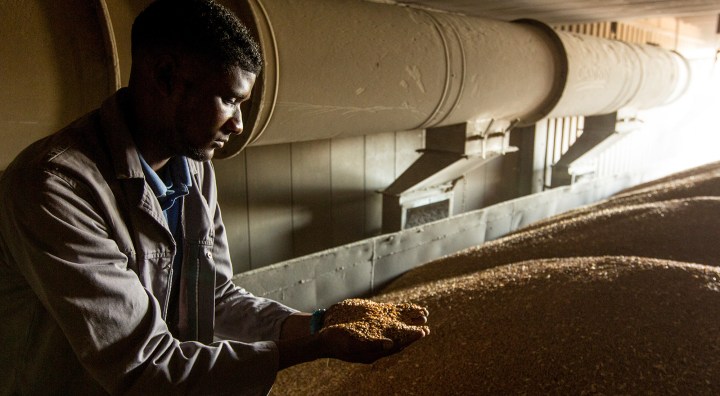#FOODJUSTICE OP-ED
Achieving food security demands that we look at new agricultural pathways

Food production must increase by approximately 70% by 2050 to meet future food and nutritional demands. Underutilised indigenous crops don’t require a lot of nutrients or pesticides that are toxic to the environment and cause eutrophication in rivers, or a lot of water which is scarce.
Food systems play a pivotal role in sustainable development as they are at the centre of the nexus between food and nutrition security, human health, provision of ecosystem services, climate change and social justice.
However, the agriculture sector faces the challenge of meeting the food demands of a growing population without degrading the environment. An increased world population of nine billion people from the current seven billion by 2050 will exert pressure on the agriculture sector to produce enough food to feed the increasing global population.
Food production must increase by approximately 70% by 2050 to meet future food and nutritional demands.
But such changes will have to happen when essential resources such as water, energy and land are depleting and degrading. The challenges are compounded by climatic and environmental changes induced by unsustainable food systems.
The need to produce more food has witnessed an increase in the global cultivated area to more than a third (4.8 billion hectares) of the total global surface area (13.5 billion hectares). As a result, agriculture is among the largest contributors to greenhouse gas (GHG) emissions.
As achieving sustainable food systems has been elusive, there is a need for pathways that drive towards sustainability in agriculture by 2030. A sustainable food system refers to an agricultural system that delivers healthy food to meet current food requirements for all while at the same time preserving healthy and sustainable ecosystems that are capable of providing food for generations to come, with a controlled negative impact on the environment.
It is a system that encourages local production and knowledge, providing nutritious and healthy food that is available, accessible, and affordable to all at all times while protecting farmers, workers, consumers, and communities.
In this context, the promotion and mainstreaming of underutilised indigenous crops have taken centre stage as they are adapted to harsh local climatic conditions and do not require many nutrients and chemicals compared to adapted food crops like maize, wheat, and rice.
The key argument is that underutilised crops don’t require a lot of nutrients that are toxic to the environment and cause eutrophication in rivers, or require a lot of water which is scarce.
Visit Daily Maverick’s home page for more news, analysis and investigations
However, a food system is complex as it comprises sub-systems that include a farming system, waste management system and input supply system. It is also intricately connected to other related systems, such as energy, water, trade and health systems.
The interconnectedness of these systems indicates that any structural change in a food system might originate from a change in another system. Changes in a food system could, for example, be triggered by a policy that promotes more biofuel in the energy system, impacting the food system.
Thus, a food system requires circular modelling to guide informed strategic policies that lead to sustainability in the agricultural value chain. The Water Research Commission of South Africa (WRC) and its partners have developed innovations that drive the agriculture sector towards sustainable food systems.
The complexities of food systems require a shift from the business-as-usual approach towards adapting to new standards and norms, including cultural changes that promote sustainability.
Transitioning towards sustainable food systems is built around integrated strategic policies formulated around the intricately linked resources of water, land, environment and energy, as well as nutrition and health.
This is practised in the knowledge that transformational transitions are evolutionary, open-ended, non-linear, and based on searching, learning, and experimentation to achieve desired outcomes. They are mainly supported by circular models that are capable of addressing today’s challenges that cut across all sectors and, therefore, require integrated, iterative, and cross-sectoral interventions.
Therefore, transitioning towards a sustainable food system requires changes in land use, agricultural and cultural practices. Such changes are informed by transformational and integrated approaches capable of providing pathways to sustainable food systems, but to achieve optimum results, we recommend the following:
- Integrated pathways should emphasise critical biophysical and economic “leverage points” in food systems, with a focus on resource-use efficiency and on enhancing food production processes and the performance of the environment with the least effort and cost. This calls for the adoption of modern technologies that enhance productivity;
- Advances that are earmarked to improve agricultural productivity should also consider enhancing the resilience of food systems. Although high-efficiency and mechanised agriculture has many benefits, it is also highly vulnerable to disasters that include extreme weather events, novel pests and diseases, and economic shocks;
- There is an urgent need to develop methods to evaluate trade-offs of agricultural practices and balance with the advances in technological developments. Research should develop decision support tools to support management decisions, productivity, and environmental stewardship;
- Sustainable development in the agriculture sector should be at par with technological development, as informed by circular modelling which enhances transformational change, ensuring food security and environmental performance of food systems; and
- Transitioning towards sustainable food systems should be supported by coherent policies that create a strategic and conducive environment for agroecology.
Nexus planning and circular economy approaches provide the decision support pathways leading to transformational change in the agricultural value chain, ensuring socio-ecological sustainability.
Achieving sustainable food systems requires balancing social, economic, and ecological systems, the three pillars of sustainable development. This requires interventions from both the public and private sectors as the current business-as-usual approach continues compounding existing challenges. DM
Dr Luxon Nhamo is a Research Manager at the Water Research Commission.





















Comments - Please login in order to comment.